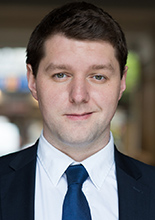DA alumnus David Pluskota on his career since graduating from DLG 48 in 2012

DA: Following your studies at the DA, you became Policy Coordinator at the European Commission. What exactly are your responsibilities on the job and how did your career path look like so far?
David Pluskota: I am a Policy Coordinator at the European Commission’s Directorate-General for Regional & Urban Policy (DG REGIO). I am working in the outermost regions’ unit which is responsible for nine EU regions located in the Atlantic and Indian Oceans, the Caribbean and South America that benefit from a special status under EU law. Our unit coordinates Commission policies and legislation for the outermost regions in cooperation with all other Commission services. We also work closely together with the governments and administrations of the outermost regions as well as their respective Member States France, Portugal and Spain.
As a Policy Coordinator, I have been responsible for coordinating a new Commission Communication to set out a new strategy for and with the outermost regions, monitoring and contributing to EU policies and legislation on agriculture, taxation and customs and informing the outermost regions’ administrations on legislative changes and specific provisions in EU funds and programmes.
My career path turned out to focus a lot on EU affairs while working on a wide variety of topics. Following my studies at the Diplomatic Academy and subsequently at the College of Europe, I did two internships. First, at the Academic Cooperation Association, an organisation dealing with internationalisation in higher education and research (with amazing colleagues), followed by a blue book traineeship (and extra months as Interim Policy Officer) at the European Commission’s Directorate-General for Enterprise & Industry (DG ENTR, now DG GROW) in a unit dealing with clusters and emerging industries. I then worked on EU internal market and standardisation affairs at an association in Brussels and at the Austrian Economic Chamber which I joined in the framework of their EU Young Graduate Programme. As part of this programme, I was posted to work at the European Parliament for Member of European Parliament (MEP) and currently first Vice-President Othmar Karas for 3 years, which has been so far probably the most intense, rewarding and formative experience in my career path.
Have you always been interested in this specific career, or has this interest developed over time?
At the beginning of my studies at the DA, I considered a career in diplomacy. However, I gravitated more towards European Union affairs, which led me to my current career path. My objective was to pass the European Personnel Selection Office (EPSO) generalist competition in order to work in the EU institutions – which eventually and luckily worked out.
How has the DA helped you develop your career?
The DA offered so many interesting courses and classes that I ended up accumulating one-third ECTS credits more than actually foreseen for the Diploma Programme. It was a very intense year that helped me to learn how to cope with high workload, different assignments and tight deadlines. This has proven very beneficial for my further studies, work and career. Moreover, the Diplomatic Academy enjoys an excellent reputation which has certainly helped me in my career development.
Is there a specific skill set taught at the DA that is particularly useful for your current job?
I would mention in particular the language classes and soft skill seminars. I very fondly recall our language classes in French with Madame Cali and in English with Keith Chester and Senj Temple. Dedicating a considerable part of the diploma programme’s curriculum to language learning at a high proficiency level in an interdisciplinary context of politics, current affairs and international relations really sets the Diplomatic Academy apart from other institutions. I also have the best memories of the soft skill seminars in the diploma programme, such as on press conference simulation, communication & rhetoric or protocol & etiquette. The skills I learned on public speaking have been extremely useful – and I truly believe made a difference for me in some decisive moments.
Where do you think the future will take you?
Little did I know that learning French, Portuguese and Spanish in my late teenage years would help me one day land a job at the European Commission to work on and with the outermost regions. An EU career is often advertised with the prospect of a "lifetime of different jobs" – of course depending on the right skills, profile and knowledge. So, let’s see what may be next.
Disclaimer
The information and views set out in the replies to these questions are those of the author and do not necessarily reflect the official opinion of the European Commission.
[May 2022]